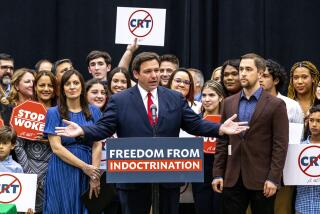Anti-Tobacco Verdict Overturned in Florida
- Share via
In a significant victory for the tobacco industry, a Florida appeals court Monday threw out a $750,000 verdict won against Brown & Williamson Tobacco Corp. by a smoker two years ago, ruling that the lawsuit was filed too late and that the trial judge had made erroneous rulings.
Gary Black, an analyst with Sanford C. Bernstein & Co., a New York investment firm that has substantial tobacco holdings, predicted that the decision will have “very broad implications for other [cigarette] trials.”
But Stephanie Hartley, an attorney for former smoker Grady Carter, said she is confident the ruling will have little resonance beyond this case. Nonetheless, she said the decision will be appealed to the Florida Supreme Court.
Thomas Bezanson, an attorney for Brown & Williamson, said in a brief formal statement, “We are gratified that the court of appeals has applied the law in this case.”
When a Jacksonville, Fla., jury ordered the subsidiary of BAT Industries of Britain to pay damages to Carter in August 1996, it was only the second time in 40 years of litigation that a U.S. cigarette company had been ordered to compensate a smoker. The verdict sent shock waves through the industry. Within hours, the value of Philip Morris shares plummeted by more than $11 billion, even though it was not a defendant in the case.
Since then, Carter’s lawyers have had mixed results, losing two cases and more recently winning nearly $1 million on behalf of a smoker’s widow earlier this month, a verdict that included the first punitive damages ever meted out against the industry. In addition, the once legally impregnable cigarette companies have paid $36 billion in the last year to settle massive cases filed against them by attorneys general from four states.
Carter, 68, had sued Brown & Williamson, the nation’s third-largest cigarette manufacturer, in February 1991, contending that the company was responsible for the lung cancer he developed after smoking for 44 years. The jury agreed, concluding that cigarettes were a defective product and that the company was negligent because it had failed to warn consumers about the health hazards of smoking.
However, a three-judge panel of the Florida Court of Appeals, based in Tallahassee, ruled that the suit “was filed more than four years after Grady Carter knew or should have known . . . that he had a smoking-related disease.” Moreover, the court ruled that even if Carter had filed the suit on time, the verdict would have been overturned because of a 1969 federal law barring suits based on claims that cigarette warning labels were inadequate.
In addition, the judges held that the trial judge erroneously allowed Carter’s lawyers to use documents from Brown & Williamson’s files even though his claims stemmed from his long-term consumption of Lucky Strikes, an American Tobacco Co. product. Brown & Williamson had acquired American and was the defendant as American’s corporate successor. Some documents indicated that Brown & Williamson had declined to provide information about research it conducted or sponsored on cigarettes to the surgeon general’s office when it was gathering information for its landmark 1964 report on smoking and health.
The appeals court said that even though the trial judge had instructed the jury that there was no direct claim against Brown & Williamson, “we do not believe the instruction was adequate to dispel the prejudice to [the company], particularly when, for example, during opening statement to the jury, [Carter’s] counsel told the jury that Brown & Williamson conducted ‘secret’ research on addiction to nicotine which it never turned over to the surgeon general.”
The appellate judges also held that jurors should not have been permitted to hear about a secret memo written by Brown & Williamson general counsel Addison Yeaman in 1963, privately taking a position at odds with what the company was saying in public. The memo became public in 1994, along with thousands of other company documents stolen by paralegal Merrill Williams. In that memo, Yeaman declared, “We are, then, in the business of selling nicotine, an addictive drug effective in the release of stress mechanisms.”
Hartley contended that the rulings were aberrational, noting that judges all over the country had admitted the Yeaman memo and many of the other stolen documents in cases during the last two years.
*
UNLIKELY ALLIANCE
The tobacco bill was killed by an odd alliance of industry friends and foes. A1
More to Read
Inside the business of entertainment
The Wide Shot brings you news, analysis and insights on everything from streaming wars to production — and what it all means for the future.
You may occasionally receive promotional content from the Los Angeles Times.










